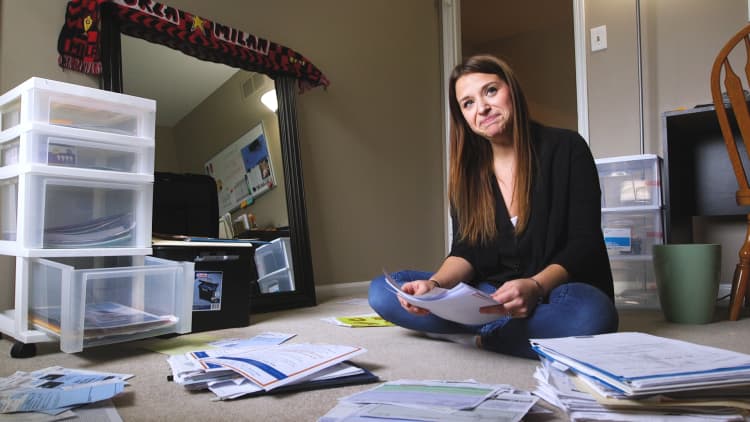House Democrats introduced a plan Wednesday to insure all Americans through Medicare, as the push for a sweeping shift to universal health coverage gains more traction ahead of pivotal elections next year.
The "Medicare-for-all" proposal, introduced by Rep. Pramila Jayapal, D-Wash., will face backlash from critics who have warned about its potentially enormous cost — and Republicans who aim to cast Democrats as radicals drifting toward socialism.
Here's what Jayapal's legislation would do:
- It would create a single-payer, government-funded health-care program within two years, eliminating the age 65 threshold for Medicare eligibility.
- It would not charge beneficiaries copays, premiums or deductibles.
- The plan would cover prescription drugs, vision, dental, mental health, substance abuse and maternal care. It would also provide universal coverage for long-term care for people with disabilities.
- The proposal notably does not include methods to pay for the health-care overhaul. Jayapal mentioned higher taxes on the wealthy or contributions from employers as potential ways to fund it.
House Speaker Nancy Pelosi has not endorsed the health-care plan. Numerous Democrats who helped their party flip the House last year by winning ideologically split, GOP-held districts have also distanced themselves from the proposal. A Pelosi spokesman did not immediately respond to a request to comment on whether Pelosi will back the legislation or bring it to a vote.

Still, the measure marks a victory for activists and the party's left wing, who have pushed for more drastic action to expand coverage and reduce costs. Jayapal says the "Medicare-for-all" bill has more than 100 co-sponsors.
"Is this a bold and ambitious plan? Damn straight it is. Because it has to be," the representative said in introducing the bill. She called health care a "human right," adding that "whether you're rich or poor you should have the same quality of guaranteed health care."
Democrats won House control last year in large part by attacking Republican efforts to repeal the Affordable Care Act and its protections for people with pre-existing medical conditions. Since the party took control in January, the debate has shifted to how best to expand insurance coverage and cut coverage and drug costs for consumers.
Several Democratic contenders for the 2020 presidential nomination have embraced "Medicare-for-all." Presidential candidate Sen. Bernie Sanders, I-Vt., helped to put "Medicare-for-all" into the political mainstream during his 2016 bid. He introduced a similar bill to Jayapal's in 2017, and four other declared 2020 presidential candidates — Sen. Cory Booker of New Jersey, Sen. Kirsten Gillibrand of New York, Sen. Kamala Harris of California and Sen. Elizabeth Warren of Massachusetts — co-sponsored it.
Others have called for more incremental steps, such as an optional Medicare or Medicaid buy-in, as some Democrats worry appearing too radical will hurt their chances in presidential and congressional elections. On Wednesday, Jayapal responded to those who would argue the proposal costs too much.
"Just remember that the only ones who can't afford to let this bill pass are these pharma and insurance companies who can't afford to lose massive profits if we pass this bill," she said.
In January, 56 percent of Americans favored a "Medicare-for-all" system, versus 42 percent who opposed it, according to a Kaiser Family Foundation poll. However, support for such a plan falls when Americans are told it could require most Americans to pay more in taxes or eliminate private insurance companies.
Jayapal highlighted support from various labor unions and public interest groups on Wednesday. She also disputed the notion that House members from ideologically balanced districts would not support the plan. One congressman who won a swing district last year — Rep. Josh Harder of California — appeared with Jayapal to back her plan Wednesday.
Republicans quickly attacked the proposal. Even if the Democratic-held House votes on and passes the legislation, the GOP-controlled Senate is unlikely to approve it.
The National Republican Congressional Committee — the House GOP's campaign arm — called the health plan House Democrats' "latest socialist idea" on Wednesday.
— Reuters contributed to this report.



